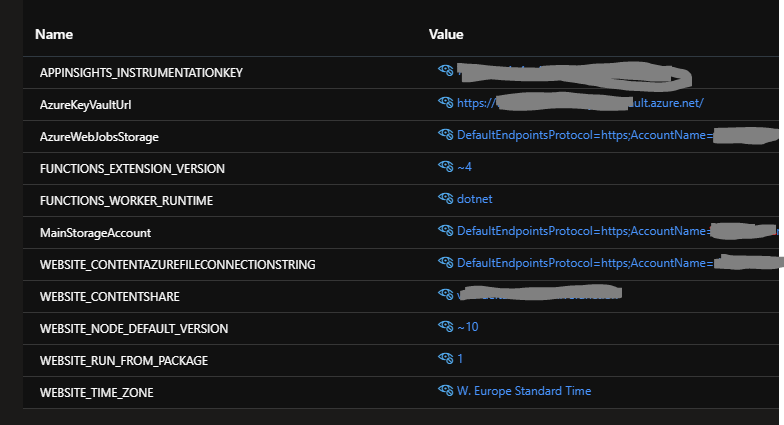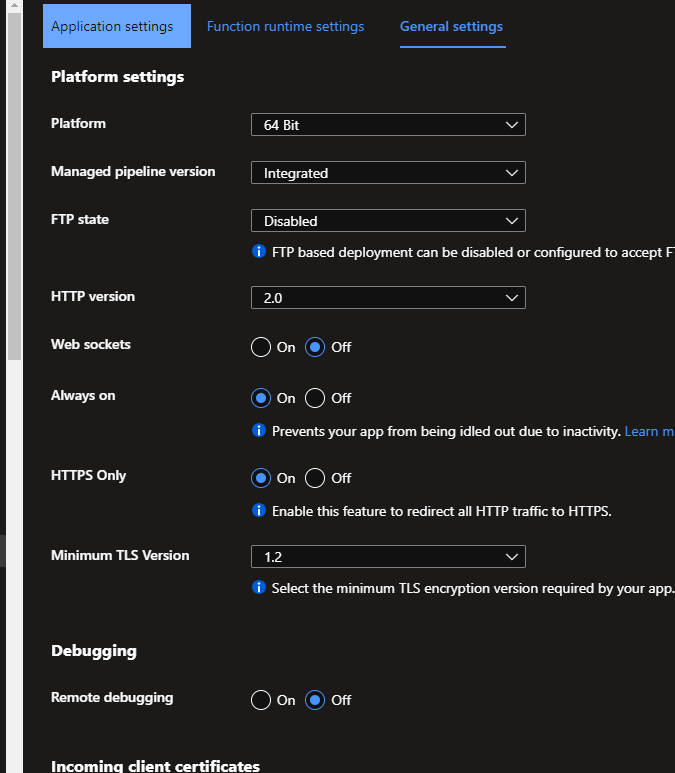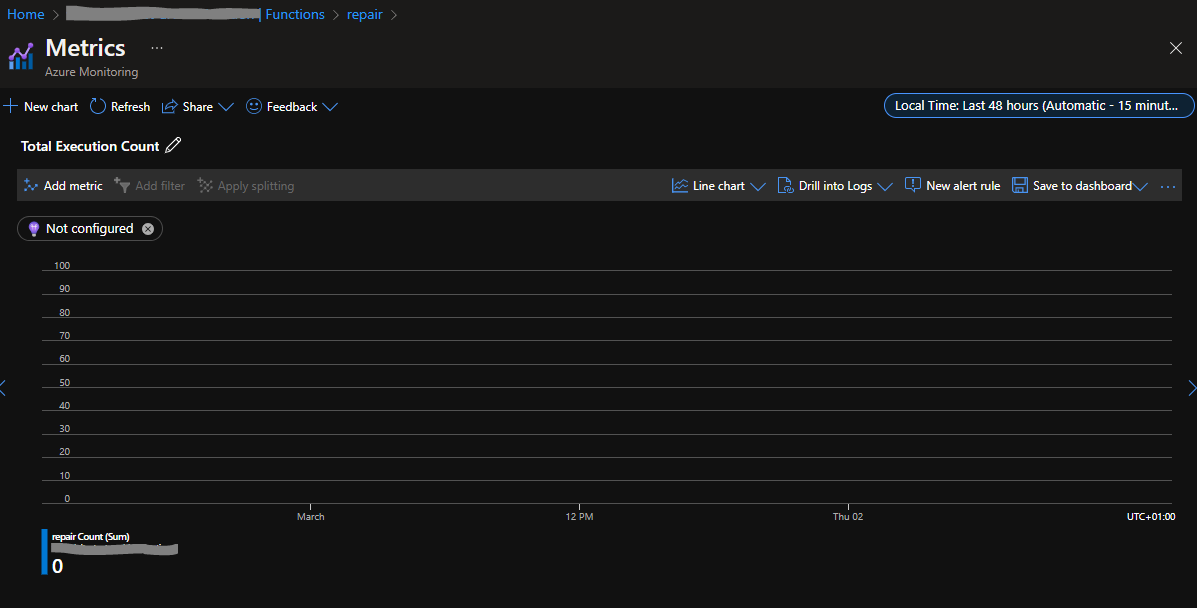Hi
I have a function app that has multiple triggers, each with different type of triggers. But the timetriggers are not firing. Also I am not able to start triggers from the Azure portal console. The buttons are greyed out and this message is below (Your app is currently in read only mode because you are running from a package file. To make any changes update the content in your zip file and WEBSITE_RUN_FROM_PACKAGE app setting.) WEBSITE_RUN_FROM_PACKAGE is set to 1.
Though the blob and queue triggers fire as per expected.
Are you using Consumption or App Service Plan?
App Service Plan (P1V2 and S1). The app service plan has 3 (4) apps. 2 webapps, 1 staging slot (production only) and 1 function app. For all apps I switched to 64bit and 'Always On'. Doing this did not make a difference.
If Consumption, how did you deploy?
Azure Pipelines: The resources are created with a Bicep template and the deploy is done from a YAML pipeline (see below).
Are you using the v1 runtime, or the v2 runtime?
v4 Runtime
Are you setting WEBSITE_TIME_ZONE?
Yes, for all apps in the service plan: W. Europe Standard Time
What is your CRON expression set to, and what is your expectation about what it means.
I tried several and I am aware that there was a BUG on the part of Microsoft with timezones and timetriggers (in 2018).
Currently I am doing some basic CRON expression to rule out as much as possible, but still it won't fire.
"0 0 0 * * *" which I expect to run once per day, during night.
"0 0 0 * * 0" which I expect to run once per week, on Sunday?.
"0 * * * * *" every minute, which is for testing only, should be once per hour during weekdays between 09:00 and 20:00
Give a specific UTC time at which you expected your function to get called, and found that it wasn't. Also, explain how you are determining that it is not getting called. If some cases, the function may get called, but it may not be obvious due to some logging issue.
I am using various logs within the Azure portal. Application Insights and the monitoring graphs in the Azure Function and within the Functions itself
And most importantly, include a sample invocation ID so we can find your app and look into the issue.
For the most part I can't, since I can't fire them manually and they are not firing by itself.
2023-03-01 23:00:06.840: Executing 'historytimer' (Reason='Timer fired at 2023-03-02T00:00:06.1168496+01:00', Id=b8d964c0-fb54-4e17-af33-a3cb2f7db004)
2023-03-01 23:00:16.215: Executed 'historytimer' (Succeeded, Id=b8d964c0-fb54-4e17-af33-a3cb2f7db004, Duration=10098ms)
resource appServicePlan 'Microsoft.Web/serverfarms@2022-03-01' = {
name: appServicePlanName
location: location
kind: 'windows'
sku: {
name: appServicePlanSku (P1V2 or S1, depending environment)
capacity: 1
}
}
/* FUNCTION APP */
resource storageAccountArchive 'Microsoft.Storage/storageAccounts@2022-05-01' = {
name: '${storageName}${stagingEnvironment}'
location: location
sku: {
name: 'Standard_LRS'
}
kind: 'Storage'
}
// ARCHIVE FUNCTION
resource applicationInsightsArchive 'Microsoft.Insights/components@2020-02-02' = {
name: archiveFunctionName
location: location
kind: 'web'
properties: {
Application_Type: 'web'
Request_Source: 'rest'
}
}
resource functionAppArchive 'Microsoft.Web/sites@2022-03-01' = {
name: archiveFunctionName
location: location
kind: 'functionapp'
identity: {
type: 'SystemAssigned'
}
properties: {
httpsOnly: true
virtualNetworkSubnetId: virtualNetwork.properties.subnets[0].id
serverFarmId: appServicePlan.id
siteConfig: {
vnetRouteAllEnabled: true
http20Enabled: true
ftpsState: 'Disabled'
minTlsVersion: '1.2'
use32BitWorkerProcess: false
alwaysOn: true
appSettings: [
{
name: 'AzureWebJobsStorage'
value: 'DefaultEndpointsProtocol=https;AccountName=${storageAccountArchive.name};EndpointSuffix=${environment().suffixes.storage};AccountKey=${storageAccountArchive.listKeys().keys[0].value}'
}
{
name: 'MainStorageAccount'
value: 'DefaultEndpointsProtocol=https;AccountName=${storageAccount.name};EndpointSuffix=${environment().suffixes.storage};AccountKey=${storageAccount.listKeys().keys[0].value}'
}
{
name: 'AzureKeyVaultUrl'
value: keyVault.properties.vaultUri
}
{
name: 'WEBSITE_CONTENTAZUREFILECONNECTIONSTRING'
value: 'DefaultEndpointsProtocol=https;AccountName=${storageAccountArchive.name};EndpointSuffix=${environment().suffixes.storage};AccountKey=${storageAccountArchive.listKeys().keys[0].value}'
}
{
name: 'WEBSITE_CONTENTSHARE'
value: toLower(archiveFunctionName)
}
{
name: 'FUNCTIONS_EXTENSION_VERSION'
value: '~4'
}
{
name: 'WEBSITE_NODE_DEFAULT_VERSION'
value: '~10'
}
{
name: 'APPINSIGHTS_INSTRUMENTATIONKEY'
value: applicationInsightsArchive.properties.InstrumentationKey
}
{
name: 'FUNCTIONS_WORKER_RUNTIME'
value: 'dotnet'
}
{
name: 'WEBSITE_RUN_FROM_PACKAGE'
value: '1'
}
{
name: 'WEBSITE_TIME_ZONE'
value: 'W. Europe Standard Time'
}
]
}
}
}
- task: UseDotNet@2
displayName: Install .NET 6 SDK 6.0.111
inputs:
packageType: sdk
version: '6.0.111'
installationPath: $(Agent.ToolsDirectory)/dotnet
includePreviewVersions: false
- task: VSBuild@1
displayName: Build SLN
inputs:
solution: '**/*.csproj'
- task: DotNetCoreCLI@2
displayName: Publish Archive Worker
inputs:
command: publish
arguments: '--configuration Release --output publish_output_archive'
projects: '**/*.csproj'
publishWebProjects: false
modifyOutputPath: false
zipAfterPublish: true
- task: AzureFunctionApp@1
displayName: Deploy Archive Worker
inputs:
azureSubscription: '${{ parameters.appName }}-${{ parameters.environment }}'
appType: functionApp
appName: '${{ parameters.appName }}-${{ parameters.environment }}-archivefunction'
package: 'publish_output_archive/**/*.zip'
enableCustomDeployment: true
deploymentType: runFromZip




